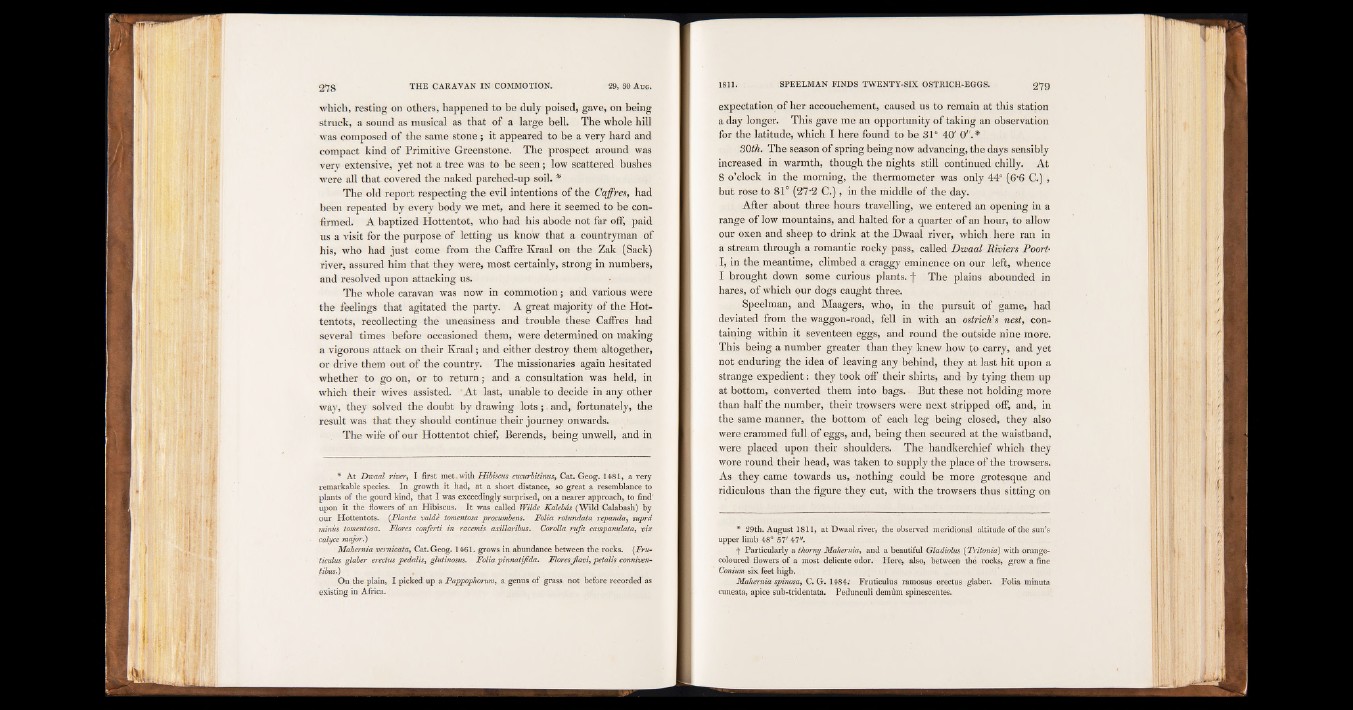
which, resting on others, happened to be duly poised, gave, on being
struck, a sound as musical as that of a large bell. The whole hill
was composed of the same stone ; it appeared to be a very hard and
compact kind of Primitive Greenstone. The prospect around was
very extensive, yet not a tree was to be seen; low scattered bushes
were all that covered the naked parched-up soil. *
The old report respecting the evil intentions of the Caffres, had
been repeated by every body we met, and here it seemed to be confirmed.
A baptized Hottentot, who had his abode not far off, paid
us a visit for the purpose of letting us know that a countryman of
his, who had just come from the Caffre Kraal on the Zak (Sack)
river, assured him that they were, most certainly, strong in numbers,
and resolved upon attacking us.
The whole caravan was now in commotion; and various were
the feelings that agitated the party. A great majority of the Hottentots,
recollecting the uneasiness and trouble these Caffres had
several times before occasioned them, were determined on making
a vigorous attack on their Kraal; and either destroy them altogether,
or drive them out of the country. The missionaries again hesitated
whether to go on, or to return; and a consultation was held, in
which their wives assisted. ' At last, unable to decide in any other
way, they solved the doubt by drawing lo ts;. and, fortunately, the
result was that they should continue their journey onwards.
The wife of our Hottentot chief, Berends, being unwell, and in
* At Dvoaal river, I first met.with Hibiscus cucurbitinus, Cat. Geog. 1481, a very
remarkable species. In growth it had, at a short distance, so great a resemblance to
plants of the gourd kind, that I was exceedingly surprised, on a nearer approach, to find'
upon it the flowers of an Hibiscus. It was called Wilde Kalebas (Wild Calabash) by
our Hottentots. (Planta valde tomentosa procumbens. Folia rotundata repanda, suprd
minus tomentosa. Flores conferti in racemis axillaribus. Corolla rufa campanulata, vix
ccdyce major.')
Mahemia vemicata, Cat. Geog. 1461. grows in abundance between the rocks. (Fru-
ticulus glaber erectus pedal is, glutinosus. Folia pinnatifida. FloresJlavi, petalis conniven-
tibus.)
On the plain, I picked up a Pappophorum, a genus of grass, not before recorded as
existing in Africa.
expectation of her accouchement, caused us to remain at this station
a day longer. This gave me an opportunity of taking an observation
for the latitude, which I here found to be 31° 4 (V 0".*
30th. The season of spring being now advancing, the days sensibly
increased in warmth, though the nights still continued chilly. At
8 o’clock in the morning, the thermometer was only 44° (6'6 C.) ,
but rose to 81° (27'2 C .), in the middle of the day.
After about three hours travelling, we entered an opening in a
range of low mountains, and halted for a quarter of an hour, to allow
our oxen and sheep to drink at the Dwaal river, which here ran in
a stream through a romantic rocky pass, called Dwaal Riviers Poort-
I, in the meantime, climbed a craggy eminence on our left, whence
I brought down some curious plants, f The plains abounded in
hares, of which our dogs caught three.
Speelman, and Maagers, who, in the pursuit of game, had
deviated from the waggon-road, fell in with an ostrich’s nest, containing
within it seventeen eggs, and round the outside nine more.
This being a number greater than they knew how to carry, and yet
not enduring the idea of leaving any behind, they at last hit upon a
strange expedient: they took off their shirts, and by tying them up
at bottom, converted them into bags.- But these not holding more
than half the number, their trowsers were next stripped off, and, in
the same manner, the bottom of each leg being closed, they also
were crammed full of eggs, and, being then secured at the waistband,
were placed upon their shoulders. The handkerchief which they
wore round their head, was taken to supply the place of the trowsers.
As they came towards us, nothing could be more grotesque and
ridiculous than the figure they cut, with the trowsers thus sitting on
# 29th. August 1811, at Dwaal river, the observed meridional altitude of the sun’s
upper limb 48° 57' 47".
f Particularly a thorny Mahemia, and a beautiful Gladiolus (Tritonia) with orange-
coloured flowers of a most delicate odor. Here, also, between thè rocks, grew a fine
Conium .six feet high .
Mahemia spinosa, C. G. 1484.’ Fruticulus ramosus erectus glaber. Folia minuta
cuneata, apice sub-tridentata. Pedunculi demùm spinescentes.